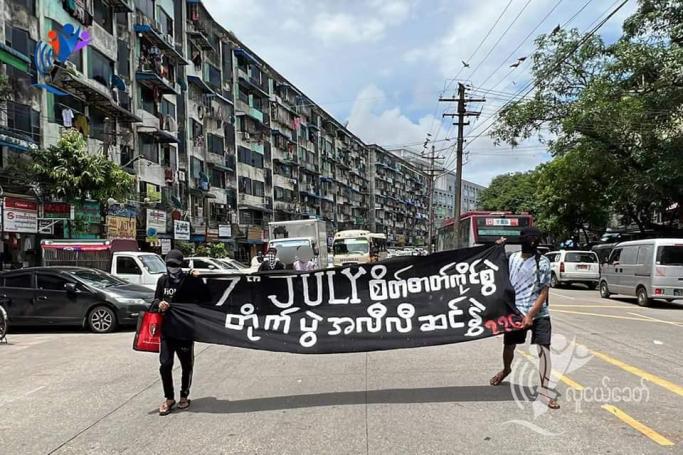This past week, student demonstrations were held commemorating 60 years since previous dictator, Ne Win, ordered the very first massacre of students at Yangon University, as well as the first major strikes by garment factory workers in one of Yangon’s major industrial zones since the coup attempt.
Campaign group Progressive Voice summed up the student protests and strikes.
In 1962, after seizing power in a military coup, General Ne Win ordered the massacre of protesting students at Yangon University, killing at least 100. The following day, the historic Student Union building, a symbol of anti-colonial resistance, was blown up.
Each year, students in Myanmar commemorate this act of brutality with remembrance activities. The protests this and last year, coming after another attempt to seize control of the state by a power-hungry general, are all the more salient.
On 7 July this year, student-led protests were held in towns and cities across Myanmar, including Sagaing, Tanintharyi, and Bago Regions, Kachin, and Mon States, and the two biggest cities of Yangon and Mandalay. A banner held at one of the protests read “With a strong mind, we will fight for a new world. Never forget what happened on 7.7.1962”.
A statement by the All Burma Federation of Student Unions (ABFSU), the historic network of student unions in Myanmar, called for the people to fight the military however possible.
Speaking to Radio Free Asia, Myat Min Khant, a representative of one of the ABFSU unions said that they wanted to remind people that “we are still in the middle of the ‘Spring Revolution,’ fighting against the fascist military. We want to remind them that the fascist military and the 2008 constitution, which is the backbone of the fascist army, must be removed if they want real freedom.”
Given the extreme violence perpetrated by junta forces on peaceful protesters since February 1st last year, the bravery of such protesters is striking. This was demonstrated when a car rammed one of the demonstrations in Yangon, shown in shocking video footage. As reported by Myanmar Now, this is not the first time that peaceful demonstrations have been faced with this type of violent tactic.
However, it is not just students that protested this week. Around 2,000 striking garment factory workers in Zaykabar Industrial Zone, Mingalardon Township, Yangon took collective action against the constant abuse of their rights as workers, including being forced to work overtime, reduced pay, and unrealistic production demands.
This is the first major strike since the coup attempt, although trade unions and workers collectives were one of the first and most significant groups of people coming onto the streets in the immediate aftermath of the junta’s attempted power-grab.
The worsening working conditions are directly linked to the junta’s actions. As outlined in a recent report by Freedom and Labour Action Group, the junta “has arrested many union and labor leaders and has taken various forms of action to suppress labor unions, making it nearly impossible to organize safely.”
Progressive Voice believes that this persecution of unions and labour groups has had a negative impact on working conditions which is compounded by the economic crisis manifest in high inflation, fewer jobs, and the halving of the value of the Myanmar Kyat - all a direct consequence of the military’s coup attempt.
Another instance of industrial action - wildcat strike - held by food delivery riders from the company, Food Panda, in June over attempts to cut pay as well as other issues such as adequate health insurance for work-related injuries was also widely supported by the public.
Employers such as Food Panda cutting wages in this time of severe economic hardship and political persecution makes a mockery of any corporate social responsibility discourse.












